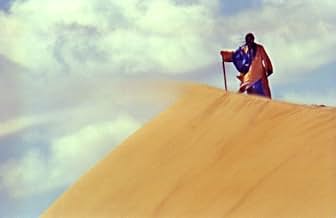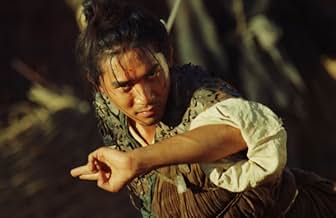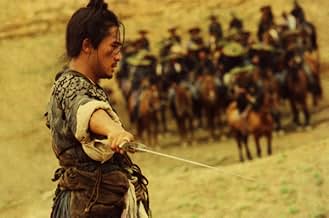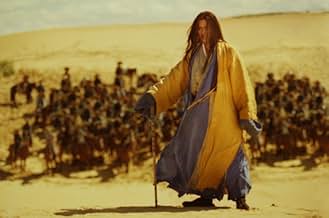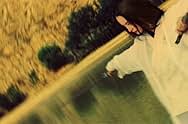AVALIAÇÃO DA IMDb
7,0/10
18 mil
SUA AVALIAÇÃO
Um assassino de coração partido se muda para o deserto, onde encontra espadachins habilidosos para executar seus assassinatos encomendados.Um assassino de coração partido se muda para o deserto, onde encontra espadachins habilidosos para executar seus assassinatos encomendados.Um assassino de coração partido se muda para o deserto, onde encontra espadachins habilidosos para executar seus assassinatos encomendados.
- Prêmios
- 9 vitórias e 13 indicações no total
Tony Leung Chiu-wai
- Blind Swordsman
- (as Tony Chiu Wai Leung)
Collin Chou
- Swordsman
- (não creditado)
Shun Lau
- Leader of Ouyang's Opponents in Opening Battle
- (não creditado)
Li Yin
- Rebel swordsman
- (não creditado)
Avaliações em destaque
Although I enjoy them, I seldom re-watch slow and introspective movies. Ashes of Time is the exception to the rule, as it haunts me so much that I have already given it three viewings! It may be because of the wonderful pictures, the essential yet poignant dialogues or the grave & epic music, nevertheless Ashes of Time is a fascinating movie!
Set in a tavern in the middle of the desert, it tells us stories of different swordsmen and deals with the theme of unrequited love. All the people, in fact, had to face a rejection.. and now strive to find a way to overcome the delusion and go on with their life. Swordsmanship is mostly viewed as an outlet to bring out the inner passions and frustrations.
The protagonist, Ouyang Feng [Leslie Cheung] is one of those swordsmen, who left his lady [Maggie Cheung] and his village to pursue fame and glory, convinced that she would have waited for him to return. Now instead he faces loneliness and the fact that she has married his elder brother.
The most peculiar aspect of the movie is the pictures, so beautifully shot that each still can make a wonderful portrait. Even the battles, rather than being filmed continuously, are rendered as a sequence of separate shots, thus remaining more indelibly impressed in our head. Indeed, the movie also focuses about memory (whom the movie title probably refers to) and its power to keep alive moments of the past, that otherwise would perish in the flow of time. Highly recommended! 9/10
Set in a tavern in the middle of the desert, it tells us stories of different swordsmen and deals with the theme of unrequited love. All the people, in fact, had to face a rejection.. and now strive to find a way to overcome the delusion and go on with their life. Swordsmanship is mostly viewed as an outlet to bring out the inner passions and frustrations.
The protagonist, Ouyang Feng [Leslie Cheung] is one of those swordsmen, who left his lady [Maggie Cheung] and his village to pursue fame and glory, convinced that she would have waited for him to return. Now instead he faces loneliness and the fact that she has married his elder brother.
The most peculiar aspect of the movie is the pictures, so beautifully shot that each still can make a wonderful portrait. Even the battles, rather than being filmed continuously, are rendered as a sequence of separate shots, thus remaining more indelibly impressed in our head. Indeed, the movie also focuses about memory (whom the movie title probably refers to) and its power to keep alive moments of the past, that otherwise would perish in the flow of time. Highly recommended! 9/10
Near the end, the proprietor of an inn perched on the windy edge of a sandy desert that stretches to the horizon has an epiphany; he has never before actually stopped to observe the desert, not as a transition, but as destination, as something that you don't calculate how to cross, but observe as a place you have crossed to reach. I have written the almost exact same idea (different setting) in one of my screenplays. This is the personal connection with a favourite film I value so much. Film becomes more than film, I see film as dream, a consciousness briefly shared then forgotten. It's that feeling of dreaming the same dream with a great artist that makes me tingle.
This is a film like the best of novels, a web woven of fragmented image and word, drives and desires, rendered cinematically alive when the two coalesce to reveal yawning chasms of human experience, the one common shared human experience we all know. The film's opening serves as present tense and WKW builds fascinating removes from it to the point where the final story of the film climaxes in the past with shocking reverberations that make me rush through the entire film, clawing my way back to the present and previous past occurrences, to change my perspective.
At the beginning of the film, a master swordsman arrives at an inn to offer the inn keeper a gulp from a wine that makes you forget the past. The inn keeper refuses. Throughout the film we happen upon characters, or characters happen upon the film as it passes time in that wind-torn inn by the desert, fixed in position by memory, by their inability or willinglessness to let go a human passion or folly, revenge or love however distant and impossible. We all need something to live for the inn keeper muses, and we know sometime we'll cling to the uglier most obsessive aspects of our nature to get us through the night. But this is all we have, not something to separate us from animals because even a dog will come to know the hand that strikes it, but all we have as humans to distinguish us from creation, being able to cling to that sad bitter memory of unfulfillment for years and make our unvanquished madness dear to us.
This is all a bit of a game, life is through the remove of storytelling, it becomes myth and fabrication, but what wouldn't we give to go back and play it again. In the end we discover that the wine that makes you forget the past is regular wine and a character is only set free when he finds out his love, love he had and denied until he realized how precious it was to him and came back to find it gone, has died. But that was already two years ago and he's stood in place for those two years, allowing himself to be released from his selfimposed exile when a piece of paper reaches his hands, as though even absolution from guilt or shame or obligation can only properly come to pass in an official manner.
WKW gives us swordplaying spectacle to go with this but he doesn't focus on it. Swords strike and fighters leap into the air in blurry shapes of color and motion yet the eye doesn't rest on the details of the fight but rather centers on facial expressions and the maddening ferocity of it all, like it's all a dance and we're dancing right in the middle of it. To say this is a wuxia is to set different expectations for it. Here poetry is not a poetry of appearances. As with his previous films, WKW tells us marvellous things about obsession and release, the yearning to remember and forget, and about letting ourselves go into new beginnings.
This is a film like the best of novels, a web woven of fragmented image and word, drives and desires, rendered cinematically alive when the two coalesce to reveal yawning chasms of human experience, the one common shared human experience we all know. The film's opening serves as present tense and WKW builds fascinating removes from it to the point where the final story of the film climaxes in the past with shocking reverberations that make me rush through the entire film, clawing my way back to the present and previous past occurrences, to change my perspective.
At the beginning of the film, a master swordsman arrives at an inn to offer the inn keeper a gulp from a wine that makes you forget the past. The inn keeper refuses. Throughout the film we happen upon characters, or characters happen upon the film as it passes time in that wind-torn inn by the desert, fixed in position by memory, by their inability or willinglessness to let go a human passion or folly, revenge or love however distant and impossible. We all need something to live for the inn keeper muses, and we know sometime we'll cling to the uglier most obsessive aspects of our nature to get us through the night. But this is all we have, not something to separate us from animals because even a dog will come to know the hand that strikes it, but all we have as humans to distinguish us from creation, being able to cling to that sad bitter memory of unfulfillment for years and make our unvanquished madness dear to us.
This is all a bit of a game, life is through the remove of storytelling, it becomes myth and fabrication, but what wouldn't we give to go back and play it again. In the end we discover that the wine that makes you forget the past is regular wine and a character is only set free when he finds out his love, love he had and denied until he realized how precious it was to him and came back to find it gone, has died. But that was already two years ago and he's stood in place for those two years, allowing himself to be released from his selfimposed exile when a piece of paper reaches his hands, as though even absolution from guilt or shame or obligation can only properly come to pass in an official manner.
WKW gives us swordplaying spectacle to go with this but he doesn't focus on it. Swords strike and fighters leap into the air in blurry shapes of color and motion yet the eye doesn't rest on the details of the fight but rather centers on facial expressions and the maddening ferocity of it all, like it's all a dance and we're dancing right in the middle of it. To say this is a wuxia is to set different expectations for it. Here poetry is not a poetry of appearances. As with his previous films, WKW tells us marvellous things about obsession and release, the yearning to remember and forget, and about letting ourselves go into new beginnings.
"Ashes of Time Redux" is Wong Kar Wai's venture into the martial arts genre. However, energetic action and narrative clarity take a backseat to the visual poetry that contemplates wounded hearts, loneliness and the memories of lost love that cut deeper than any sword. Best appreciated as a sensory experience, "Ashes of Time Redux" unfolds as a series of beautiful yet melancholic images like the soft brush strokes of a Chinese landscape painting. Even the sword fights are shot as swirling, hallucinatory dreamscapes. The haunting desert landscape gorgeously captured in saturated colors by cinematographer Christopher Doyle, a brooding cello score by Yo-Yo Ma and the beauty of the actors (an all-star Hong Kong cast) contribute to a movie experience that both pleases the senses and engages the heart.
10guneo
As a Chinese, I had chance to watch Kar Wai Wong's movies in my childhood. One of them is Dung che sai duk. But at that time, I couldn't even understand any of the actor's lines. Didn't understand why they people fight or cry. Then I fell asleep.
But after many years, when I went to university, when the girl I deep in love with left me to another country. I saw DVD of this film again, alone. And this time I cannot help enjoying it. Every actor's line touched me very very much.
What's behind the mountain? May be another mountain, and another. How wonderful it'd be to forget the past. Everyday would be a new beginning. Isn't that great? What's love? Maybe love is to leave the one you love, to win the one then finally find you have lost everything including yourself.
Now I have my job and new life. Many things have been past for a long time. And this movie, I cannot remember some of the scenes. But sometimes I still recall lots of words they say. When I am alone, when I feel gloomy or a little bit sad, the words will come to my mind with beautiful music and the scene of huge desert.
In this world, something's gonna change, something's not. If you cannot have someone, the only thing you can do is not to forget.
I will never forget.
But after many years, when I went to university, when the girl I deep in love with left me to another country. I saw DVD of this film again, alone. And this time I cannot help enjoying it. Every actor's line touched me very very much.
What's behind the mountain? May be another mountain, and another. How wonderful it'd be to forget the past. Everyday would be a new beginning. Isn't that great? What's love? Maybe love is to leave the one you love, to win the one then finally find you have lost everything including yourself.
Now I have my job and new life. Many things have been past for a long time. And this movie, I cannot remember some of the scenes. But sometimes I still recall lots of words they say. When I am alone, when I feel gloomy or a little bit sad, the words will come to my mind with beautiful music and the scene of huge desert.
In this world, something's gonna change, something's not. If you cannot have someone, the only thing you can do is not to forget.
I will never forget.
I have my message headed with a WARNING because I don't want any readers to be misled and go rushing for this movie thinking it's like anyone of those Chinese Wuxia movies. This is not an action based movie, it only has "sword fighting" world as a background. This is what always made WKW's films different from any others'. This film has probably the least action scenes compared to any other sword fighting films made within the last 15 years.
I called it Timeless because seen again today, you don't find it outdated like some others' films. This is among the only 4 Chinese films that I will enjoy watching again every 2 or 3 years and I think this is the most "timeless" among the 4.(The other 3 are Love Eterne(Li Han Hsiang), A Touch of Zen(King Hu) and Days of Being Wild(WKW))
This is the kind of film that you know it's great even if you don't understand it. You don't need to understand its story in order to enjoy it. It's message is simply about "memories" and "regrets". It said something like "Regrets is the most painful feeling" and "regrets and unhappiness because of memories".It's the most complicated among WKW's 7 or 8 films(till 2046 and Eros). I don't fully understand it during the first viewing but I was totally surprised and mesmerized. I am the type that will consider a film good only if after watching, surprised me and felt that i could not thought of such a film. If I can expect or imagine a film's outcome, I will not call it great. Even after 4 viewings now, I am not totally sure I have figured out all its sequences yet but it doesn't matter. Some of the scenes and editions are paced so fast that you may not recall seeing it. Just like his recent 2046. This is the work of a brilliant director,because you need more than 1 viewing to fully get it so you must buy a copy for future viewing. Heard that even the Venice Filmfest Jury has to give it a prize although they don't understand what's it about.
Those who don't know how to appreciate a good film may not understand a WKW film as he seldom stick to a particular genre, his films' genre is simply WKW and it's all about sights and sound in WKW-style. Original, stylish and trend setting. After his Ashes of Time and Fallen Angels swept all the major awards during the HK Film Awards in the same year, 2 most prominent HK directors changed style and tried to follow WKW-style but both failed(Tsui Hark in Dao(Blade) and Stanley Kwan in Hold Me Tight.
WKW has mentioned that movies, to him is most is sights and sound and we see it clearly in this film. The music and the cinematography is the best.
Those who don't like WKW films may criticize that he don't has a script or don't know what he wants until the final edition. I totally disagree. I think WKW always know what he wants and completed the film just the way he wants it, otherwise how could all his films are being so well received by critics ?. As for the viewers, what we want is the finished work. We don't care the original idea or the casts. We only care for the outcome. I mentioned it because this film took 2 years to complete and along the way, plot and actors have changed.
Leslie Cheung - nominated for best acting here but I find him better in 2 other WKW films, Days of Being Wild and Happy Together(WKW won best director at Cannes). Brigitte Lin is superb in a dual character role/s. Tony Leung and Carina Lau are always good(usually and only) in WKW films. Maggie Cheung(unbilled) has her best 2 single take shots(her fans must keep this.) Even pop idol Michelle Yeung who never act well appeared like she acted.
I strongly recommend this film to any film student or critics. Those who like "2046" or Tsui Hark's The Blade will like it. This is not WKW's best but I consider it his most UNIQUE. Like any other WKW movies, it's a collectors' item and a future classic, if not already one.
I called it Timeless because seen again today, you don't find it outdated like some others' films. This is among the only 4 Chinese films that I will enjoy watching again every 2 or 3 years and I think this is the most "timeless" among the 4.(The other 3 are Love Eterne(Li Han Hsiang), A Touch of Zen(King Hu) and Days of Being Wild(WKW))
This is the kind of film that you know it's great even if you don't understand it. You don't need to understand its story in order to enjoy it. It's message is simply about "memories" and "regrets". It said something like "Regrets is the most painful feeling" and "regrets and unhappiness because of memories".It's the most complicated among WKW's 7 or 8 films(till 2046 and Eros). I don't fully understand it during the first viewing but I was totally surprised and mesmerized. I am the type that will consider a film good only if after watching, surprised me and felt that i could not thought of such a film. If I can expect or imagine a film's outcome, I will not call it great. Even after 4 viewings now, I am not totally sure I have figured out all its sequences yet but it doesn't matter. Some of the scenes and editions are paced so fast that you may not recall seeing it. Just like his recent 2046. This is the work of a brilliant director,because you need more than 1 viewing to fully get it so you must buy a copy for future viewing. Heard that even the Venice Filmfest Jury has to give it a prize although they don't understand what's it about.
Those who don't know how to appreciate a good film may not understand a WKW film as he seldom stick to a particular genre, his films' genre is simply WKW and it's all about sights and sound in WKW-style. Original, stylish and trend setting. After his Ashes of Time and Fallen Angels swept all the major awards during the HK Film Awards in the same year, 2 most prominent HK directors changed style and tried to follow WKW-style but both failed(Tsui Hark in Dao(Blade) and Stanley Kwan in Hold Me Tight.
WKW has mentioned that movies, to him is most is sights and sound and we see it clearly in this film. The music and the cinematography is the best.
Those who don't like WKW films may criticize that he don't has a script or don't know what he wants until the final edition. I totally disagree. I think WKW always know what he wants and completed the film just the way he wants it, otherwise how could all his films are being so well received by critics ?. As for the viewers, what we want is the finished work. We don't care the original idea or the casts. We only care for the outcome. I mentioned it because this film took 2 years to complete and along the way, plot and actors have changed.
Leslie Cheung - nominated for best acting here but I find him better in 2 other WKW films, Days of Being Wild and Happy Together(WKW won best director at Cannes). Brigitte Lin is superb in a dual character role/s. Tony Leung and Carina Lau are always good(usually and only) in WKW films. Maggie Cheung(unbilled) has her best 2 single take shots(her fans must keep this.) Even pop idol Michelle Yeung who never act well appeared like she acted.
I strongly recommend this film to any film student or critics. Those who like "2046" or Tsui Hark's The Blade will like it. This is not WKW's best but I consider it his most UNIQUE. Like any other WKW movies, it's a collectors' item and a future classic, if not already one.
Você sabia?
- CuriosidadesThis film had an exhausting effect on Wong Kar-Wai. While on hiatus during the editing process he wrote and shot Amores Expressos (1994) to "clear his head".
- Citações
Ou-yang Feng: People say, when you can't have what you want, the best you can do is not to forget.
- Versões alternativasWong Kar-wai revisited the film and created the Redux version which premiered at the Cannes Film Festival 2008. This version has alternative footage and changes in the order of scenes. The Redux version has new opening titles, and the season's fade-ins introducing each chapter are new. It also has a new color-scheme and a new soundtrack. Some scenes from the original version have been deleted, for example the two main character's introduction in the beginning. The overall run time of the Redux version is slightly shorter than the original theatrical version.
- ConexõesFeatured in Century of Cinema: Naamsaang-neuiseung (1996)
Principais escolhas
Faça login para avaliar e ver a lista de recomendações personalizadas
Detalhes
Bilheteria
- Orçamento
- HK$ 40.000.000 (estimativa)
- Faturamento bruto nos EUA e Canadá
- US$ 174.273
- Fim de semana de estreia nos EUA e Canadá
- US$ 21.372
- 12 de out. de 2008
- Faturamento bruto mundial
- US$ 2.009.694
Contribua para esta página
Sugerir uma alteração ou adicionar conteúdo ausente

Principal brecha
By what name was Cinzas do Passado (1994) officially released in India in English?
Responda






